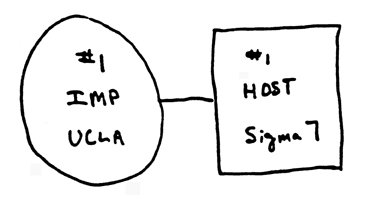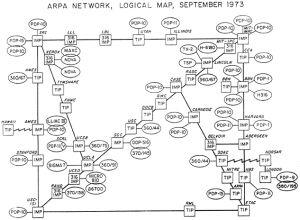|
History of the Internet.The history of the internet started way back in 1969 with the ARPANET or Advanced Research Projects Agency Network. Well actually it started a little earlier in 1961 with a guy called Leonard Kleinrock who published a paper which he called "Information Flow in Large Communication Nets". But no single person was responsible for creating the internet. It was a combination of different people and organizations working together to create the internet. The ARPANET projects goal was to link different universities together on a network so information, like email which came later, could be sent to different computers over the existing phone lines. Initially, only two nodes or computers were connected on the ARPANET and the first connection actually crashed the small network. After some troubleshooting the problem was resolved and the two computers logged in and started to communicate. Actual drawing of the first two nodes on the ARPANET
Image courtesy of Computer History Museum. The first host-to-host connection, from UCLA(University of California, Los Angeles) to SRI(Stanford Research Institute), is made on October 29, 1969. From there various protocols and papers were released to define how the internet would function in the future. ARPANET started adding 1 node a month to it's network in 1970. In 1992, students at NCSA in University of Illinois at Urbana-Champaign modify the hypertext proposal by Tim Berners-Lee, and in a few weeks MOSAIC is born within the campus. Netscape was soon released cause of MOSAIC and the WWW or World Wide Web burst into the world. The internet spreads like a wild fire and doubling each year. What began as an ARPA experiment has, in a short period of about 30 years, become the biggest and most used network of all time. History of the internet - ARPANET 1973
Image courtesy of Computer History Museum. Return from History of the Internet to History of Computers
|
Search what-is-my-computer.com

What is in my computer?

Discover what goes into a PC?





